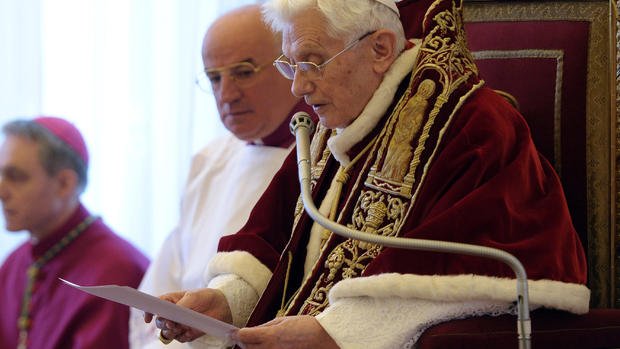Pressed for time, pope may change conclave rules
The Catholic Church could be equated to a ship with a billion passengers. So when its captain, Pope Benedict XVI, made the surprise announcement he would give up the helm on February 28, about one month before one of Catholicism's most important celebrations, Easter, it is understandable that Church leaders saw a need for a new captain sooner rather than later.
When a pope dies, there are normally nine days of mourning, and, according to canonical law, there is supposed to be no Church business conducted until a new pope is chosen.
According to rules laid out by Pope John Paul II, even without the mourning period, the soonest this papal conclave selecting a new pope could begin would be March 15. Canonical law, as it stands, says there should be at least a 15-day waiting period after the papacy becomes vacant in order to give cardinals plenty of time to make it to Rome.
Although it has mentioned the possibility previously, the Vatican said again Wednesday the pope is considering rules changes governing the papal conclave in order to speed things up, and may set the conclave to begin March 10.
Given Pope Benedict XVI's timing -- we are currently in the middle of the Lent, another important Catholic rite -- it is a good thing for church leaders a mourning period won't delay the process, but even that shortened window appears not to be enough.
Regardless of what the pope wants to do, his options may be limited, however, even if he is considered the successor of Saint Peter.
In a recent blog post, Edward Peters, a canon law expert at Sacred Heart Major Seminary in Detroit, wrote: "Popes have very extensive authority in the Church, but they are not free, and do not act as though they were free, to disregard the good order of a Church that they are bound to nurture."
Exactly what rules Benedict may seek to amend are unclear, as are many aspects of the papal succession.
When the College of Cardinals lock themselves up in the papal conclave (fun fact: the word "conclave" derives from the Latin phrase "with a key"), they are required to stay there until a new pope is elected. It could happen on the first day, or it could take weeks.
While no one really knows the inner politics of the College of Cardinals, one thing is certain: They will elect one of their own, even though technically all Catholics are eligible to become pope. Only an estimated 6 popes in the last 2,000 years were not cardinals first, the most recent being Pope Urban V, elected in 1362.
- Should abuse-tainted cardinal be allowed to vote for new pope?
- Electing a pope: Inside conclave's rituals, secrets
- The murky history of papal resignations
Whenever the conclave begins, the new pope can only be chosen by a two-thirds majority. For example, if there were 100 cardinals, the winner would need 67 votes. (There are going to be an estimated 117 cardinals in this conclave.)
Pope John Paul II had amended the rules of the long-held tradition of a two-thirds majority so that after a few rounds of voting, if no pope was chosen, a simple majority (50 percent plus 1,) could be used to elect a pope. However, Benedict, his successor, changed the rules back in 2007, thus the concern among many that this conclave could last a long time.
It is unclear whether Benedict is considering yet again altering the required vote margin in the papal election process. However, as elections in democratic nations the world-over have proven time and again, even getting a simple majority in a vote is a challenge.
The only thing certain in the upcoming election is that there will be a pope at some point, and the white smoke will appear sputtering from the Sistine Chapel and the faithful will cheer their new captain.
